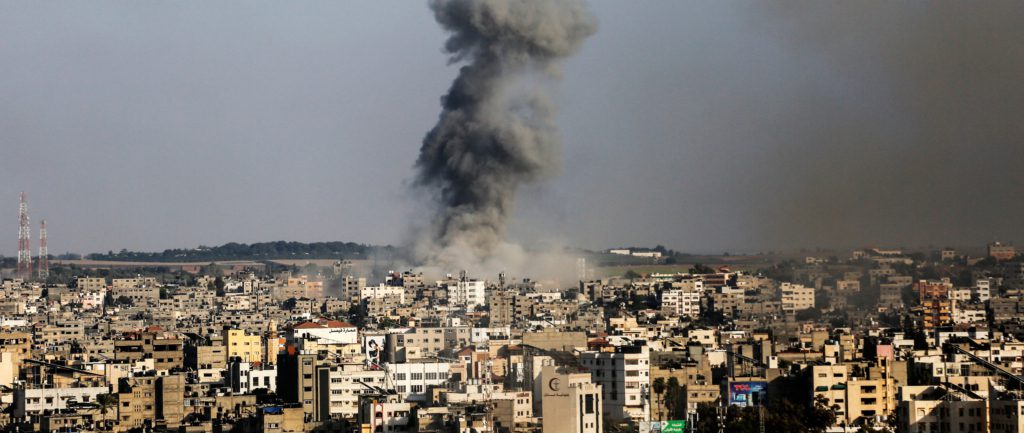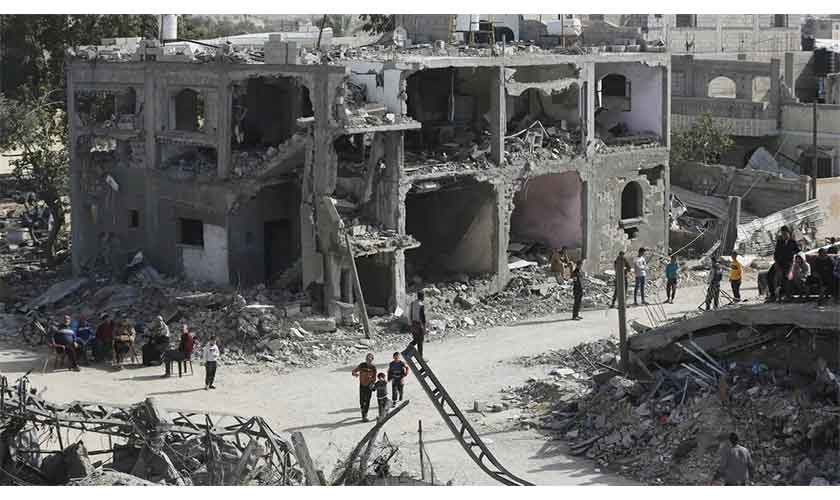





The ongoing conflict between Israel and Palestine has deep historical roots that date back to the late 19th century [bbd9075c]. The conflict originated during the decline of the Ottoman Turkish empire, which had governed Palestine for 400 years [bbd9075c]. After World War One, the British military gained control of Palestine, but their promise of independence to Arab tribes led to resentment when the region was divided between Britain and France [bbd9075c]. Jewish emigration to Palestine, driven by antisemitism in Russia and the idea of a Jewish homeland, further fueled tensions [bbd9075c]. The establishment of a Jewish state in Palestine was supported by the British in 1917, causing resentment among Palestinians [bbd9075c]. A full-scale revolt against British rule erupted in 1936, but it was harshly suppressed [bbd9075c]. World War Two and the Holocaust increased sympathy for Jews and the concept of a Jewish homeland, leading to intensified violence between Arabs and Jews in Palestine [bbd9075c]. The United Nations recommended the partitioning of Palestine into independent Arab and Jewish states, resulting in the establishment of the State of Israel in 1948 [bbd9075c]. Subsequent wars between Israelis and Palestinians have further entrenched Israeli control and domination over Palestinian life [bbd9075c]. The recent Hamas attack in southern Israel and the ongoing conflict highlight the lack of progress in resolving the conflict [bbd9075c].
The armed conflict between Israel and the Occupied Palestinian Territories (OPT) is one of the longest-running in modern history [2d44fbcb]. The conflict began on October 7, 2023, with a surprise attack by Hamas and other armed groups on Israel, resulting in the death of at least 1,200 people and the taking of over 200 hostages [2d44fbcb]. However, the roots of the conflict go beyond this event, with a long history of human rights violations and international humanitarian law violations [2d44fbcb]. Amnesty International has documented Israel's system of oppression and domination against Palestinians, which it considers to be a violation of international law and amounting to apartheid [2d44fbcb]. The term 'apartheid' refers to an institutionalized regime of systematic oppression and domination by one racial group over another [2d44fbcb]. Israel's apartheid system includes unlawful killings, torture, arbitrary detention, segregation, dispossession and displacement, and the denial of the right of return to Palestinian refugees [2d44fbcb]. Amnesty International's research shows that Israeli authorities are enforcing a system of apartheid against Palestinians in Israel and the Occupied Palestinian Territories, as well as against Palestinian refugees and their descendants [2d44fbcb]. The methods of apartheid include discrimination and segregation, dispossession of land and property, deprivation of economic and social rights, and segregation and control through discriminatory laws and policies [2d44fbcb]. The ongoing conflict and humanitarian catastrophe in Gaza highlight the importance of international humanitarian law in protecting civilians and other at-risk people during hostilities [2d44fbcb]. Amnesty International has called for an immediate ceasefire and for all parties to respect international humanitarian law [2d44fbcb]. They have also hosted a visual stunt to call on President Biden to demand a ceasefire [2d44fbcb]. Amnesty International offers free education resources on the conflict and human rights issues on their website [2d44fbcb].
Lauren Cohen Fisher, a lecturer in Jewish Studies at Colby College, gave a lecture at Bowdoin College on the history of the Israel-Palestine conflict from 1917 to 1948 [9c58e17c]. Fisher discussed five key historical moments that have shaped the political dynamic between Israel and Palestine today, including the Balfour Declaration, the White Papers of 1922, the Partition Plan of 1947, Plan D, and the Declaration of the State of Israel [9c58e17c]. She highlighted the different interpretations of these events within the Jewish and Palestinian communities [9c58e17c]. Fisher also emphasized the role of Western influence, particularly that of the United Kingdom and the United Nations, in the conflict [9c58e17c]. The lecture ended with a question and answer session, providing valuable insights into the history of the conflict and its impact on present-day violence [9c58e17c].
The recent conflict between Israel and Palestine has sparked massive protests and increased activism in support of Palestine [4f553dfd]. The article explores the historical origins of Zionism and its connection to Judaism, mentioning early Zionists like Theodor Herzl and Chaim Weizmann [4f553dfd]. It also highlights the Dreyfus Affair as a turning point for European Jews to invest in Zionist ideology [4f553dfd]. The Balfour Declaration is mentioned as a significant event with a lasting impact on Palestinian affairs [4f553dfd].
American Jews have been engaged in an intense, fractious debate over Israel's war in the Gaza Strip since October 2023 [4d218968]. While most American Jews remain broadly supportive of Israel, others have protested vigorously against U.S. support for Israel and are demanding a cease-fire in the Gaza war [4d218968]. The debate over Zionism and Israel among American Jews dates back to the late 19th century when elite Reform Jews rejected Jewish nationalism out of fear of antisemitic accusations of dual loyalty [4d218968]. The Holocaust fundamentally altered American Jews' perspectives on Zionism, with some believing that only a Jewish national homeland in Palestine could prevent another genocide, while others insisted that Jews must not contribute to making refugees of the Palestinians [4d218968]. Mainstream Jewish leaders manufactured an American Jewish consensus on Zionism and Israel by silencing Jewish critics of Zionism [4d218968]. Anti-colonialist activists in the 1960s criticized Israel's treatment of Palestinians and its alliance with colonial powers [4d218968]. In the current moment, college campuses have been riven with debates over the boundaries between student safety and free speech and whether criticism of Israel constitutes antisemitism [4d218968]. Some American Jews prioritize justice as a Jewish value and stand in solidarity with groups working for justice in Palestine, Israel, and around the world [4d218968].
In light of the evolving nature of the conflict, some commentators argue that the term 'Arab-Israeli conflict' is outdated and fails to capture the broader scope of the issue, which now involves multiple countries including the U.S., Turkey, and Iran [4b965e50]. The conflict began after the collapse of the Ottoman Empire in 1922 and has since seen Israel's declaration of independence in 1948, leading to wars with neighboring countries such as Egypt, Jordan, Iraq, Lebanon, and Syria [4b965e50]. U.S. support for Israel, which began in May 1948 under President Truman, has increased significantly since the 1990s, particularly during the Gulf Wars [4b965e50]. Iran's active support for groups opposing Israel and Turkey's potential involvement could further escalate tensions in the region [4b965e50]. As a result, some propose renaming the conflict to 'MENA-ISRAME conflict' to better reflect its wider implications and the involvement of various actors [4b965e50].
The ongoing Israeli-Palestinian conflict continues to be a deeply rooted and complex issue, with historical, political, and social factors contributing to the ongoing violence and lack of progress in resolving the conflict. The recent protests and increased activism in support of Palestine highlight the urgency of finding a solution that addresses the grievances and aspirations of both Israelis and Palestinians.